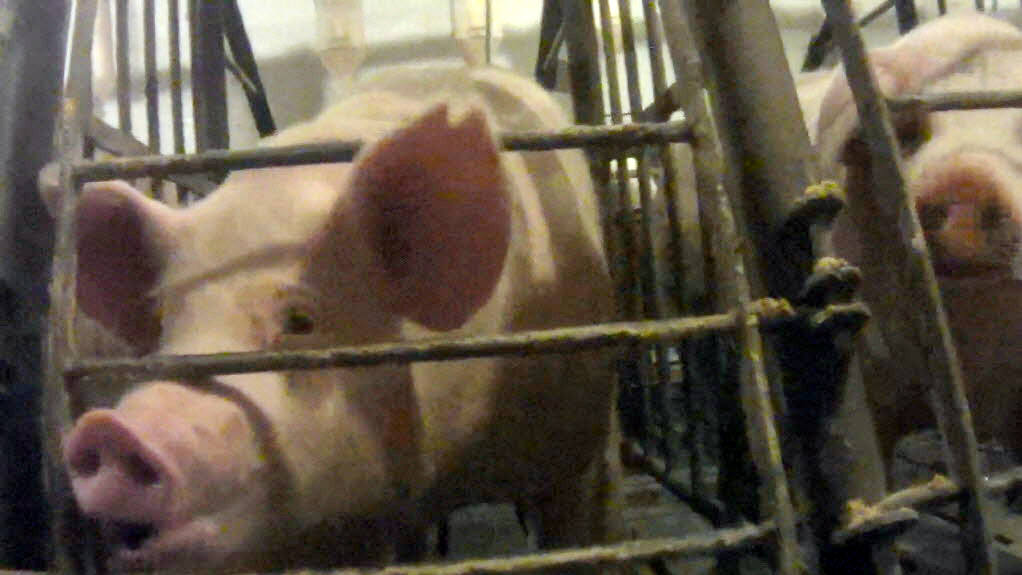"It's beyond disturbing seeing piglets being prepared for this process," the unidentified narrator, an HSUS activist, tells viewers. "It seems obvious that confining pigs in such an environment that causes open sores, extreme stress and filthy living conditions would only encourage the spread of disease."
Before we see the pile of dead piglets, we're shown how the sows at Iron Maiden are confined to narrow stalls that severely limit the animals' movement. No surprise here — these gestation crates are common in the industry, and animal welfare experts have long called on farmers to do away with them. (Many big producers are now moving away from the crates, as we've reported.)
But the HSUS claims the practice of feeding dead pigs to live pigs is illegal in the state of Kentucky, and may violate federal law, too. The Swine Health Protection Act prohibits feeding untreated garbage, which could be animal material, to pigs, unless it's "household waste."
"Pig factory farms are not 'households,' and killing piglets is not a 'household operation,'" HSUS vice president Paul Shapiro tells The Salt.
But hog farmers and veterinarians say that while feeding the guts (or stool) of dead piglets back to sows may sound icky, it's the only option they've got to keep the dreaded PEDV from decimating herds and the whole of the U.S. hog supply.
In a statement posted on Facebook, the Kentucky Livestock Coalition, a group representing farm groups in the state, called it a "widely-accepted and veterinary-recommended management practice."
Tom Burkgren, executive director of the American Association of Swine Veterinarians, says that there are no vaccines or drugs to give to sows so that their piglets won't get the lethal virus. That means the only tool farmers have is "controlled exposure," or feeding dead piglets to sows. What's more, he says, "controlled exposure" has been used for decades to protect animals against rare diseases like PEDV, which has only been in the U.S. for one year.
"When I'm faced with the choice of seeing and carrying hundreds of dead baby pigs out of a barn or overcoming the 'ick factor,' I'm going to get over that 'ick factor,' because my goal is to save lives," Burkgren tells The Salt. (Burkgren adds that mother pigs sometimes cannibalize their babies like this on their own — he's seen it on farms where pigs are confined, and ones where they're allowed to pasture.)
But the HSUS points out that there's a higher risk of infection in large industrial hog operations like Iron Maiden, compared to smaller farms that raise their pigs outdoors. And Michael Blackwell, senior director of veterinary policy for HSUS, says farmers do not necessarily have to resort to feeding pigs to pigs to prevent the spread of PEDV.
"Keeping animals in a distress-free environment would help their immune systems. PEDV is a sentinel of the system not being in the best interest of the health of the animals," Blackwell told reporters in a press conference. "We know we have limitations in the system in terms of inadequate space and nutrition."
As for HSUS' allegations of general abuse of the sows at Iron Maiden, Brent Burchett, a spokesman for the Kentucky Livestock Coalition, told The Salt in an email: "I have personally toured this farm ... After watching the video, I believe it does not reflect the values of the producer in question."
Copyright 2014 NPR.
